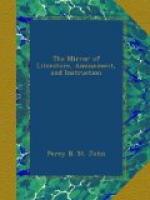I ogled Jane, who heard me say
That “Rome was not built in a day,”
When lo: Sir Fleet O’Grady
Put this, my saw, to sea again,
And proved, by running off with Jane,
“Faint heart ne’er
won fair Lady.”
Aware “New Brooms sweep clean,”
I took
An untaught tyro for a cook,
(The tale I tell a fact is)
She spoilt my soup; but, when I chid,
She thus once more my work undid,
“Perfection comes from
Practice.”
Thus, out of every adage hit,
And, finding that ancestral wit
As changeful as the clime
is:
From Proverbs, turning on my heel,
I now cull Wisdom from my seal,
Who’s motto’s
“Ne quid nimis.”
New Monthly Magazine.
* * * * *
THE GATHERER.
A snapper up of unconsidered trifles.
SHAKSPEARE.
* * * * *
SHIP LAUNCH.
In a few months a new ship will be launched, called the Reform. Admiral, William the Fourth—Chief Mate, Grey—Pilot, Brougham—Purser, Russell—Crew, the people of England, Scotland, and Ireland. Bound to Palace Yard, Westminster; freight uncommonly cheap, with good stowage.
N.B. For further particulars inquire of Bob Oldborough, at the sign of the Tumble down Dick, Borough, Southwark.
P.T.W.
* * * * *
Gold coins (ix James I.) were raised by proclamation, 2s. in every 20s.
Groat.—In the Saxon time, we had no silver money bigger than a penny, nor after the conquest, till Edward III. who about the year 1351, coined grosses (i.e. groats, or great pieces) which went for 4d. a-piece; and so the matter stood till the reign of Henry VII. who in 1504 first coined shillings.
G.K.
* * * * *
TWO THOUSAND POUNDS REFUSED BY A BURGESS FOR HIS VOTE.
Oldfield, in his History of Boroughs, says, “On the death of the late Lord Holmes, a very powerful attempt was made by Sir William Oglander and some other neighbouring gentlemen, to deprive his lordship’s nephew and successor, the Rev. Mr. Troughear Holmes, of his influence over the Corporation of Newport, Isle of Wight. The number of that body was at that time twenty-three, there being one vacancy amongst the aldermen, occasioned by the recent death of Lord Holmes. Eleven of them continued firm to the interest of the nephew, and the same number was equally eager to transfer that interest to Sir William Oglander and the Worsley family. A Mr. Taylor of this town, one of the burgesses, withheld his declaration, and as his vote would decide the balance of future influence, it was imagined that he only suspended it for the purpose of private advantage.




